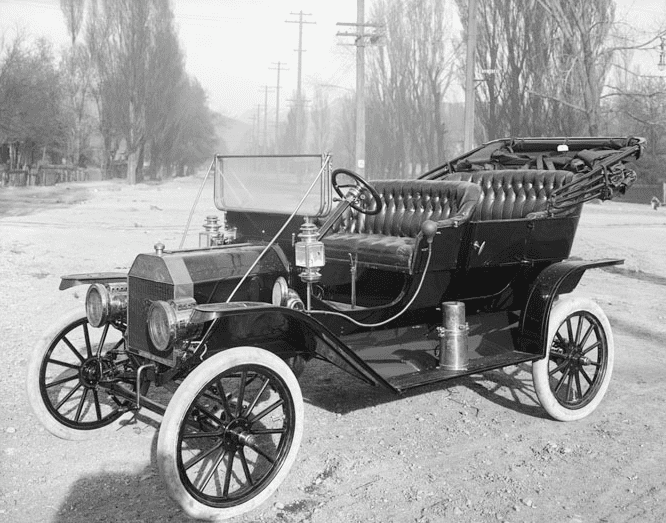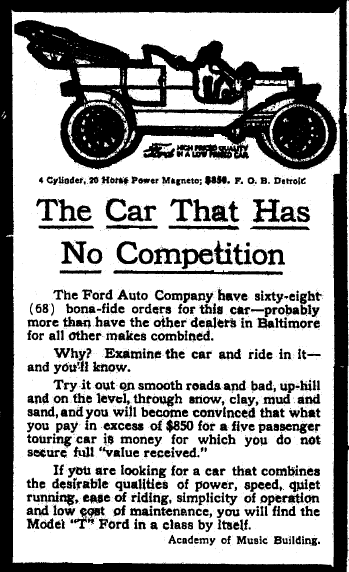Introduction: Duncan Kuehn is a professional genealogist with over eight years of client experience. She has worked on several well-known projects, such as “Who Do You Think You Are?” and researching President Barack Obama’s ancestry. In this blog post, Duncan searches old newspapers to learn about Henry Ford and his assembly line-produced Model T that changed the world.
The Model T Ford, introduced on 1 October 1908, is one of the most influential cars of all time. Henry Ford perfected the assembly line system to create an affordable car for the emerging middle class. In fact, some argue that the Model T created the middle class.

Assembly Lines Enable Mass Production
The Ford Motor Company’s streamlined assembly line was able to produce the Model T at a record pace and for a reasonable price. Initially the car cost $850, changing the automobile from a luxury item only the rich could afford to a staple of many Americans’ lives.
[search_box]
Newspaper Ads Fuel Demand
Along with innovations in the factory, Henry Ford was a genius at promotion, using newspapers all across the country to advertise his Model T Ford. As this 1909 newspaper ad proclaims:
If you are looking for a car that combines the desirable qualities of power, speed, quiet running, ease of riding, simplicity of operation and low cost of maintenance, you will find the Model ‘T’ Ford in a class by itself.

The new car was so popular that the Ford Motor Company had to work hard to keep up with demand for the Model T.
Drive Testing & Road Trips
Henry Ford promoted his newest model by taking it on a road trip to show that the lighter Model T could perform just as well as heavier cars. Personally, I was fascinated by the description of the roads in this article, described as being buried by six inches of dust prior to a rain storm that created a muddy mess.
The widespread availability of cars made the family trip a national pastime. Road trips became opportunities for families to reconnect and spend time together. Even shorter outings to local sites of interest became more popular since it could all be done in a day. People were more likely to move further from where they grew up since it became more convenient to go home for a visit. Shipping also became possible and local specialties could be sold to a wider audience.
As mentioned before, the roads of the time were inadequate by today’s standards. The roughness of the roads made travel difficult and uncomfortable. In buying a car, purchasers were looking for something sturdy enough to handle a constant beating from the road—and also something that wouldn’t transfer that beating to them. To test the Model T’s abilities they took it on long-distance trips.
They performed grueling driving tests.
They tried racing in the Model T.
(Note: this newspaper photo of a stripped-down Model T with no roll bars, windshield, airbags, seatbelts, or even much of a passenger cabin to speak of makes every medic cringe, despite the car’s top speed of just 45 miles per hour.)
Despite all the abuse they put the car through, the Model T remained sturdy enough to stay at the top of the sales charts—although the commentator in the following news article is clearly not a Model T fan.
Car Options & Accessories
The Model T had a crank start. It was open to the elements, although it had a roll-top of sorts. Ford sold the car in the most basic state, but then offered all sorts of accessories—including a stethoscope-type attachment to listen to the engine and check for damage, a grill to turn the engine into a barbeque of sorts, and so on. This was a brilliant move by Ford to cash in on his customers’ aftermarket needs, and allowed owners to customize their car to their requirements and desires.
[search_box]
Keeping Up with the Joneses
Locally, it was a big deal when someone purchased a Model T or took a trip in one. Numerous articles appear talking about Mr. So-and-So’s new purchase or car trip that specifically mention the Model T by name.
Here’s another example, listing all the people who have recently bought Fords in the Washington, D.C., area.
(Note: this list has a seemingly high number of doctors purchasing the car. It makes sense when you remember that this was during the time of the traveling doctor. A car would be a wonderful way for him or her to get to the patient quicker.)
The Model T’s design changed over time, but remained the most popular car of its era.
Lasting Impact on Modern Life
Car collectors and enthusiasts today are still excited about the Model T. Historians write about its impact on our modern life. If you ever wonder why it was such a big deal, just imagine your life without your car. Modern life depends on it. And the assembly line system which produced the Model T is what makes it possible for most of us to own a car today.
Do you have any photos of your ancestors driving around in their Model T?
Share your Model T family pictures and stories in the comments section.
[bottom_post_ad]